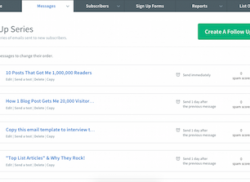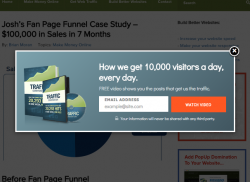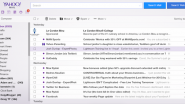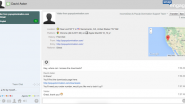Interview with Jordan Goldman of Unigo.com
Jordon Goldman is the founder of Unigo.com. In this interview he speaks to Dean Hunt about his experience as a young entrepreneur and also what he has learned in setting up Unigo.com.
Unigo is a free online platform for college students to share their opinions, photos, videos and documents.
Hi Jordon
First off – can we have a little background information on Jordan Goldman – where you grew up, how old you are?
I grew up in Staten Island, New York, went to Wesleyan University, and just
turned 26.
What intrigues you so much about higher education and the college selection process?
I think … choosing what college you go to is an enormous decision. It’s stressful, it’s incredibly expensive, in many cases entire families save for years and all chip in … and where you eventually go does shape you to an extent. It helps teach you how to think, helps direct how you approach problems, helps define who you are and what you do with your life. Up until very recently the best way to make this stressful, four-year,$50,000 to $250,000 decision was to buy a college guidebook. And when I was 18, I came up with an idea to help make those guidebooks a little bit better – I created a series of 100% student-written college guidebooks,called Students’ Guide to Colleges’, that were published in a couple of editions from Penguin Books. .
About a year after I stopped doing Students’ Guide, I started thinking about the limitations of print guidebooks – each college only got a small number of pages, with no photos, no videos, no interactivity. For a decision this important, that resource didn’t seem helpful enough.
High school students and parents needed more accurate, authentic, honest information. And college students needed a place where they could really represent their college lives – if they loved their school, if they had issues with it, if they were someplace in-between. The internet provided the opportunity to create an enormous, comprehensive and totally free resource that could help everyone.
I realize I’m going on a bit of a tangent here, on the very first question … but one of the things we were able to do with Unigo, that I think is pretty
exciting, is that we strove to create something that was actually
responsible and representative. That we didn’t just sit back, open a review
platform, and hope people came.
So what we did was, we hired an 18 person editorial team, and decided Unigo would initially cover 250 colleges. We spent about 3 months researching every one of those colleges. Then we hired interns on the ground, who really believed in what we were trying to accomplish and who helped corroborate our research. For the next 5 months, we reached out to current students one by one, telling them we wanted to create this giant and honest resource and asking them to be a part of it. We put in extra effort to ensure we received reviews from students from every major, extracurricular,gender, race, religion, political affiliation, sexual orientation and more …students who love their school, who have issues with it, or have mixed feelings.
In the end, at 250 colleges, more than 15,000 students contributed more than 35,000 pieces of content. In some cases, a full 10% of the student body took part. And the value of having that volume of reviews is, if we have 150 reviews of a college, you can search by a variety of criteria. You can say, only show me reviews by English majors, or African American students, or politically right-wing students at a left-wing institution … so you can see a school from the eyes of someone who’s just like you.
Unigo launched on September 17th, and now that we’re live we’re a slightly different site for high school students and college students. If you’re a high school student, Unigo gives you access to an enormous amount of free and honest information about each college – editorial overviews, reviews, photos, videos, documents and more. Very soon, we’ll be adding blogs and forums to the mix.
And if you’re a college student, Unigo gives you all the tools you need to create content about your college life. Anyone with the right .edu email address can create content about their school. They can create reviews, videos, photos, upload class notes, academic writing, creative writing, campus journalism … write blogs, interact in forums, create profiles and message their classmates and other prospective students. It’s pretty exciting so far!
Do you think the internet has the ability to affect higher education?
I really think the internet transformed – or has the ability to transform, is in the process of transforming – the entire educational landscape. So much more information is available than ever before, ideas can spread and be shared and worked on collaboratively to create all sorts of new things. And much of it is made available for free! So many traditional barriers to access have been torn down. It’s really exciting. This has really broad applications – Project Gutenberg, for example, making tens of thousands of books instantly available to everyone, or Wikipedia putting an enormous range of knowledge instantly at our fingertips – and, in the case of Unigo, it means prospective students who previously couldn’t afford to go on campus tours all across the country, who weren’t able to grab a current student by the arm and ask them questions – now they have a way to find an amazing range of authentic information right from their living rooms. Prospective students have a way to interact with one another and ask each other questions about these schools. And they have the ability to see each college from the perspective of someone just like them. Sure, Columbia is a great school. But is it a great school for African American students? What about students from California? Is it the same experience for a wealthy student as it is for someone a bit less well-off? How about a conservative student, or a gay student? Those are questions Unigo can instantly help you find the answer to. We want to move the focus away from overly broad
rankings that don’t tell you much of anything, and over to “What’s the college that’s actually best for YOU?”
Also, for current students, it gives them a platform to represent their experiences. Previously, if they loved their school, there was no real way to share that with the world. And if they had an issue with their college, they could protest in front of the library, but that’s about it. Unigo lets them create content about their college lives, and see what their classmates are saying. It really allows a conversation to start, that’s beneficial to other current students, but also for the institution, to be open to legitimate peer review, to assess what students are actually experiencing and perhaps change for the better as a result.
Unigo is currently featuring approximately 250 colleges. Are there plans to get all colleges on the site?
Absolutely. In the coming months, Unigo will be expanding to include nearly every college in the country.
What’s an important lesson you learned during the development process for Unigo that might help other entrepreneurs?
One big lesson I learned was that you need to be able – and willing to – let your idea evolve as you go along. When the idea for Unigo first came about, I reached out to some of the smartest people I could find, and asked them if I could buy them lunch and run the idea past them. And, in the beginning, the idea had plenty of flaws. People would listen, and nod their head, then go on to rip it apart – “you didn’t think of this, what would you do in this scenario, this part doesn’t make sense.” Sometimes that can be hard to hear (especially if, like I was, you’re living only on your rapidly depleting savings, sleeping on couches and staying in strange sublets, with everyone telling you to get a real job – but you’re trying to keep at it, stick to it, doing whatever you can to get the idea off the ground.)
But in the end, it’s actually the best thing in the world, the people who pick your idea apart. You have to kind of put yourself aside, and listen to what they’re saying, then go home and take out your pen and try to say okay, they identified a hole, how do I fill that hole now? Once you’ve done that, ask them to sit down with you a month later and test out your patch, see if it holds. If it doesn’t, try again.
I’d say I probably had 50 or 100 of those lunches with smart people before we raised any money to create Unigo – trying out ideas, testing them,getting shot down and building them up. But you really do learn from that process. And your idea gets immeasurably stronger. Not being defensive,and letting myself learn from them, was one of the hardest – and most worthwhile – things that got done.
Also, last thing, you shouldn’t be afraid to share your idea because you think someone might steal it, because then it will never get better. Find as many really smart people as you can, tell them about it, and really listen to their feedback.
And who knows, maybe those conversations will even lead to your idea being funded and taken off the ground.
What is it like to have a start-up in New York City?
New York City has a really amazing and supportive startup community. Right in proximity of the Flatiron building, where our office is located, there are hundreds of startups and online companies all within 20 blocks of one another. And in the center of the 20 blocks there’s this hamburger place called Shake Shack, that has amazing food, and all the different people from all the startups – this whole online ecosystem, everything from coders to designers to CEO’s to angel investors to VC’s – they all eat at Shake Shack all the time, and meet one another and hang out. I’ve just found it really helpful and welcoming. There’s also some great NYC startup blogs like Center Networks, and online communities like nextNY (founded by Charlie O’ Donnell, who’s the greatest), and angel networks like Angelsoft with David Rose and Nate Westheimer …
I’m babbling a bit, but I’ve really found the proximity and community and general good-naturedness, the real mentality of “how can we share knowledge and help one another out to create stuff that’s new and exciting and cool” … I think it’s pretty great.
How does Unigo help people, and what does it do differently than the products that came before it?
Unigo gives college students a platform to really represent themselves, create stuff about their college lives and share it …
And it lets high school students and parents take this huge, expensive, terrifying decision … and turn it into something that’s fun and real and honest, and catered to who they are so they can make the best possible college choice.
It takes an old media product, these guidebooks that have been around for the past 50 years, and transforms them into an expansive and constantly evolving free resource that’s exponentially better than any book could be.
"Do Not Write Another Blog Post Until You Watch This Free Video..."

Watch this free video to learn...
- How I got over 10,000,000 people to visit my websites.
- The types of blog post that got me all that traffic.
- How to get someone else to do it for you!










